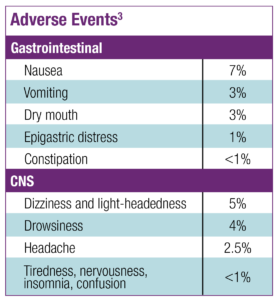FREQUENTLY ASKED QUESTIONS
What is Motofen?
Motofen comes in a 5-sided, dye-free tablet that contains difenoxin (1 mg) and atropine sulfate (0.025 mg). Motofen is taken by mouth and is chemically related to the narcotic meperidine. Atropine sulfate is present to discourage deliberate overdose.
How does Motofen work?
Motofen treats both acute diarrhea and acute exacerbations of chronic functional diarrhea. Motofen contains difenoxin, a drug that works on slowing the contraction of the smooth muscle in the colon.
What is the recommended dosage?
Motofen Dosage
- Initial dose: 2 tablets
- 1 tablet after each loose stool or every 3-4 hours as needed
- Do not exceed 8 tablets in any 24-hour treatment period
How much does Motofen cost?
Motofen costs vary. With the Savings Card, your first prescription is free, and you may pay no more than $10 for subsequent prescriptions.*
*See savings card for program details.
Who are the types of patients that would benefit most from Motofen?
For patients who are suffering from acute nonspecific or acute exacerbations of chronic functional diarrhea, we are re-introducing Motofen (difenoxin and atropine sulfate tablets; Controlled Substance – Schedule IV medication)
Indications: Adjunctive therapy in the
a) Management of acute nonspecific diarrhea
b) Management of acute exacerbations of chronic functional diarrhea
Are there individuals who should not take Motofen?
Motofen is CONTRAINDICATED in
- Patients with diarrhea associated with organisms that penetrate the intestinal mucosa
- Patients with diarrhea associated with pseudomembranous colitis associated with broad spectrum antibiotics
- Children under 2 years of age
- Patients with a known hypersensitivity to difenoxin, atropine, or any of the inactive ingredients
- Patients who are jaundiced
Please see the Prescribing Information for more details.
What are the side effects of Motofen?
The table below shows the most common side effects that occur while taking Motofen. This does not include all side effects that may occur.

The most common adverse events for Motofen (≥2%) are nausea, vomiting, dry mouth, dizziness and light-headedness, drowsiness, and headache. Constipation was reported in <1% of patients, indicating that it produces an antidiarrheal effect without causing constipation often seen with other antidiarrheal agents.
Does Motofen cause constipation?
In clinical trials, Motofen had a low incidence of constipation, less than 1%.
